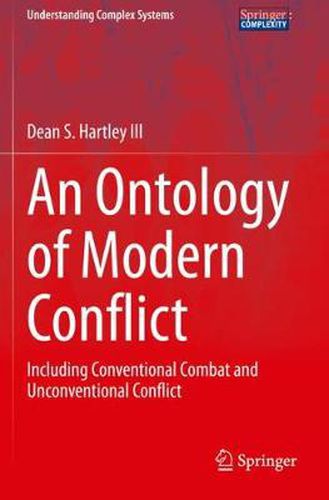Readings Newsletter
Become a Readings Member to make your shopping experience even easier.
Sign in or sign up for free!
You’re not far away from qualifying for FREE standard shipping within Australia
You’ve qualified for FREE standard shipping within Australia
The cart is loading…






This title is printed to order. This book may have been self-published. If so, we cannot guarantee the quality of the content. In the main most books will have gone through the editing process however some may not. We therefore suggest that you be aware of this before ordering this book. If in doubt check either the author or publisher’s details as we are unable to accept any returns unless they are faulty. Please contact us if you have any questions.
This volume develops and describes an ontology of modern conflict. Modern conflict is a complex adaptive system. As such, it exhibits emergent properties, or properties that are not predictable from simple descriptions of the system. The Modern Conflict Ontology (MCO) creates a structure for collecting and analyzing information regarding both conventional and unconventional conflict in the face of uncertainty.
The first three chapters of the book begin the discussion of the MCO. The first chapter introduces the foundational concepts. The second chapter discusses modern conflict in detail. The third chapter provides an overview of ontologies in sufficient detail to make the rest of the book understandable, but without covering the minutia of the subject. The next ten chapters describe the parts of the MCO. Each part is a sub-ontology and is discussed in detail, including connections to the other parts. Instances are used very liberally to ensure that the concepts are made concrete. The final chapter consolidates the descriptions of the ontology into a discussion of what we can know. It describes the implementation history and changes from the predecessor Unconventional Conflict Ontology (UCO) to the MCO, plus some uses of the ontology and potential future enhancements.
Providing an ontology that describes the entire modern conflict domain, this volume is appropriate for military professionals and academics and professionals in political science, computer science, and operations research.
$9.00 standard shipping within Australia
FREE standard shipping within Australia for orders over $100.00
Express & International shipping calculated at checkout
This title is printed to order. This book may have been self-published. If so, we cannot guarantee the quality of the content. In the main most books will have gone through the editing process however some may not. We therefore suggest that you be aware of this before ordering this book. If in doubt check either the author or publisher’s details as we are unable to accept any returns unless they are faulty. Please contact us if you have any questions.
This volume develops and describes an ontology of modern conflict. Modern conflict is a complex adaptive system. As such, it exhibits emergent properties, or properties that are not predictable from simple descriptions of the system. The Modern Conflict Ontology (MCO) creates a structure for collecting and analyzing information regarding both conventional and unconventional conflict in the face of uncertainty.
The first three chapters of the book begin the discussion of the MCO. The first chapter introduces the foundational concepts. The second chapter discusses modern conflict in detail. The third chapter provides an overview of ontologies in sufficient detail to make the rest of the book understandable, but without covering the minutia of the subject. The next ten chapters describe the parts of the MCO. Each part is a sub-ontology and is discussed in detail, including connections to the other parts. Instances are used very liberally to ensure that the concepts are made concrete. The final chapter consolidates the descriptions of the ontology into a discussion of what we can know. It describes the implementation history and changes from the predecessor Unconventional Conflict Ontology (UCO) to the MCO, plus some uses of the ontology and potential future enhancements.
Providing an ontology that describes the entire modern conflict domain, this volume is appropriate for military professionals and academics and professionals in political science, computer science, and operations research.